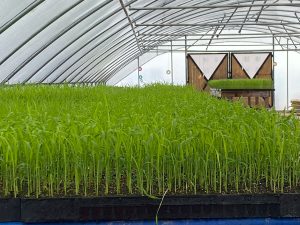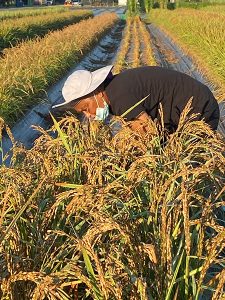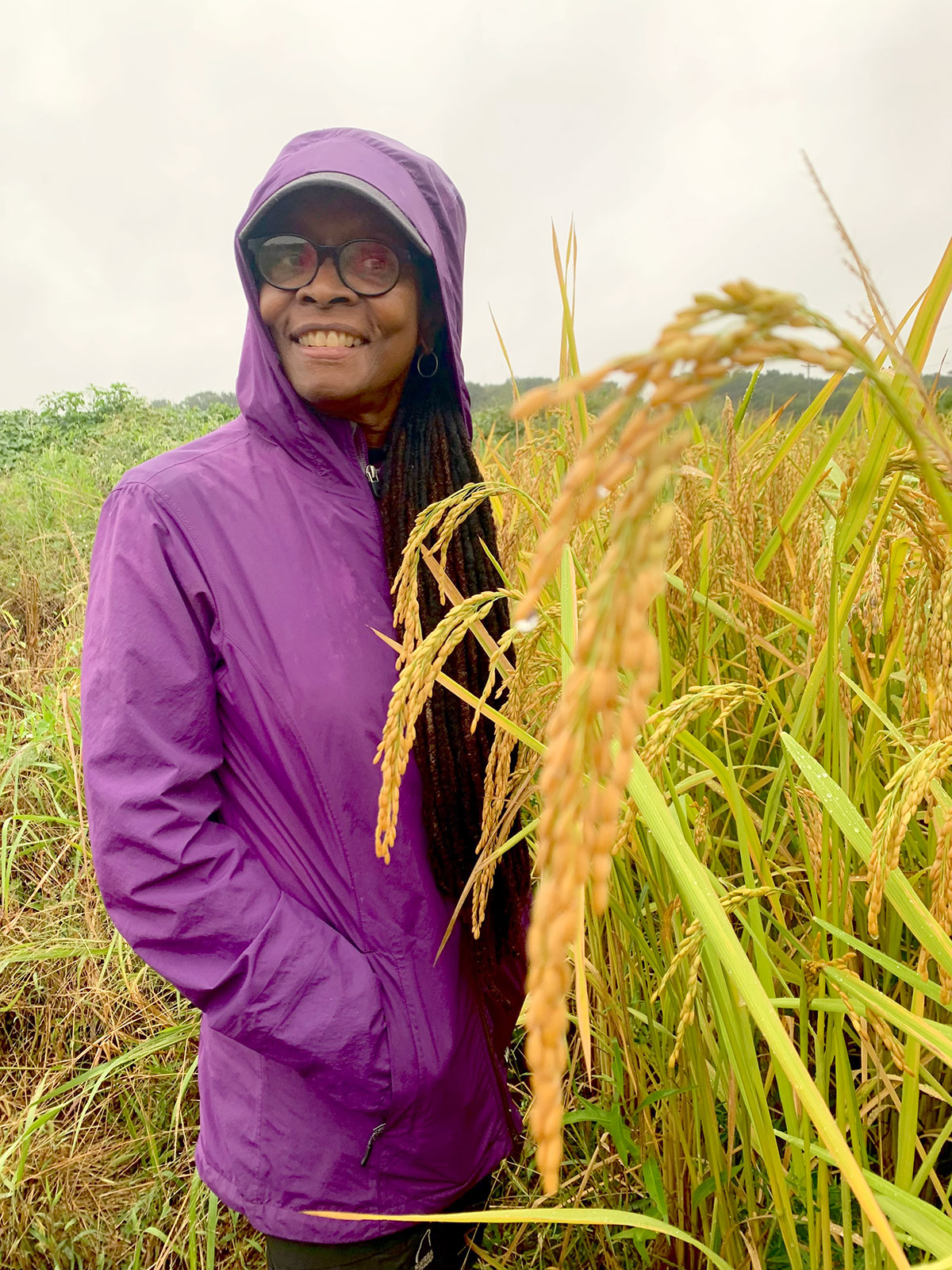Konda Mason, social justice entrepreneur and founder of Jubilee Justice, says the project’s name refers to the Biblical “Jubilee Year”—occurring every 50th year—when all leased land returned to the original owners, debts were forgiven, and indentured servants were freed. This “complete socio-economic refresh” connotes repair, reparation, and restoration.
That well describes the initiative happening on 17 acres of a former cotton plantation worked by enslaved people in the small rural town of Alexandria, Louisiana. Mason guides a team growing rice through the System of Rice Intensification (SRI), developed in the 1980s in Madagascar, a revolutionary method of planting using 50% less water (no flooded fields), 90% less seed, and 20% to 100% greater yields. The Jubilee Justice Black Farmers’ Rice Project repairs history by restoring land ownership to Black farmers, generating economic self-sufficiency, and regenerating depleted soil and ecosystem resilience through regenerative farming practices. For Mason, it’s an example of “healing backwards”: transforming institutional injustice at the intersection of land, race, money, and spirit.
The history of Black farming: a livelihood stolen

Rice seedlings in greenhouse.
Mason’s grandfather owned property in Alabama but had to move his family to California from fear of being lynched. Growing up with that story, Mason has cherished the food gardens she’s grown in every home she’s lived in; she also earned a certificate in permaculture. Since the 1920s, acreage for Black farmers has dwindled from about 20 million acres down to only 2 million—amounting to a 90% loss of property. The number of Black farmers has shrunk from a million at that time, to only about 45,000 currently—just 2% of all U.S. farmers.
The loss was systemic and intentional, Mason said. During the Jim Crow era, white landowners intimidated and threatened Black farmers into leaving their land. They would give bottom dollar for their produce or reject it completely. The federal government discriminated against Black famers when granting loans, making financial loss and foreclosure all but inevitable.
Mason sees an opportunity for restorative economics through Jubilee Justice: transforming a system of extractive capitalism and exploitation into one of shared prosperity and resources—modulated through relationships and reconciliation—while restoring racial equity. Regenerative farming is a sustainable system of agriculture that acknowledges the inherent sacredness of the land itself.
“It’s critical to own the means of production,” Mason added. “Young Black people have been dis-invested. We own the rice mill, which is run by a cooperative of Black farmers, cutting out the middleman we used to be totally dependent on. If the economic base is strong, you don’t have to lose your land.”
Fortuitous encounters launch the project

Konda Mason’s sister, Smikey, harvests SRI rice.
Mason met Elizabeth Keller in 2017 at a “Jubilee Journeys” gathering for invited guests interested in racial healing and redistribution of capital as a means to economic justice. Keller’s family owns Inglewood Farm, once a cotton plantation but now a 3,000-acre certified organic farm. After several Journey meetings, a project for Black farmers crystallized.
“Elizabeth wanted to heal not only the depleted land she inherited, but also repair the horrifying history of slave labor that happened there,” Mason said. “When I realized we needed land, I called up Elizabeth and she said, ‘Come out to Inglewood, we’ve got land.’ That spirit of regeneration has been present in every aspect of our journey here.”
Caryl Levine, co-founder of the organic rice company Lotus Foods, had introduced Mason to SRI, used by the Southeast Asia and Africa farmers whose rice she markets. Levine wanted to create a domestic supply chain in the U.S., and Mason suggested that she choose Black farmers to work with.
In 2020, the Jubilee Justice Black Farmers’ Rice Project launched at Inglewood Farm, where the project leases 17 acres.
Growing rice without flooding fields: trial and error
Mason relocated to Louisiana; she and nine other fulltime farm workers, with guidance from SRI expert Erica Styger of Cornell, are learning step by step how to grow a successful, high quality rice crop. Jubilee Justice is one of the first U.S. initiatives dedicated to the SRI method. The farmers all share commitment to regenerative, organic farming, coming either from small family farm backgrounds or climate activism circles.
“We’re not trying to do rice production yet—these are trials, and we’re the lab. We started with ¼ acre to ½ acre and last year we planted two acres. Unfortunately, it was the hottest year on record—two months of 110° heat, with no cool nights. We lost the whole crop.”
Another challenge has been weeds. Compost, mulch coverings, and fabric have all been tried; a no-till transplanter is used to cut into the mulch. A well and irrigation system have been installed. But weather can consistently intervene—entire plots of lentils and oats were wiped out by a freeze and another time flooding washed out the fields. “It’s an issue for every farmer, and for every person who eats,” Mason said.
In fact, the planting season has dropped back to June due to climate change. “The rainy season happens later every year,” she said.
Donna Isaac is a small-farm Louisiana grower who was willing to try out SRI. The flooding typically done for conventional rice production is a huge contributor to global methane emissions (12% of total) each year. The learning curve of growing rice without flooded fields was daunting, but the technical, knowledge, and marketing support from Jubilee Justice has inspired her confidence.
“We cut down on labor hours of planting and harvesting…we use cover crops with no tilling…we even have a market garden and sell our produce weekly. Once you get fertility back into the soil, it gives us a high-yielding rice crop,” Mason said.
Last May, the project rolled out its Specialty Foods and Rice Mill at the farm. The mill is solar-powered and cooperatively owned. The shining new machine represents economic security for farmers, a permanent place to mill their own harvest. Lotus Foods is waiting to buy the harvested rice; eventually the product will bear its own Jubilee Justice label.
Currently eight acres of the deeded land is used to grow rice. The remaining acres are filled with heirloom Jimmy Red wheat, heirloom corn, peas, sesame, and different legumes—which Jubilee Justice sells at its weekly farmers’ market.
Growing rice, growing justice
Eighteen farms—in nearby Mississippi, Georgia, both Carolinas, and St. Thomas—have joined the Jubilee Justice experiment, so practical knowledge is coming in from all sides.
The biggest obstacle the project faces right now, Mason said, is “finding the right formula, just how to grow the rice—so we can expand SRI. For one, we need to learn how to do it with equipment, because we don’t have the necessary labor.” The 11th Hour Project (of the Schmidt Family Foundation) is supporting Jubilee Justice in its quest to find the right equipment.
The confluence of several goals—growing not only rice but intergenerational wealth, repair of relationships, and restoration of the land—speaks to the enormity of the Jubilee Justice project.
“We’re building an institution,” Mason says. From soil to seed to society, this vertically integrated approach is creating a self-defining community. On the very soil where the “worst of the worst has happened,” a legacy epitomizing the opposite is being created. And that is regeneration at its best.





